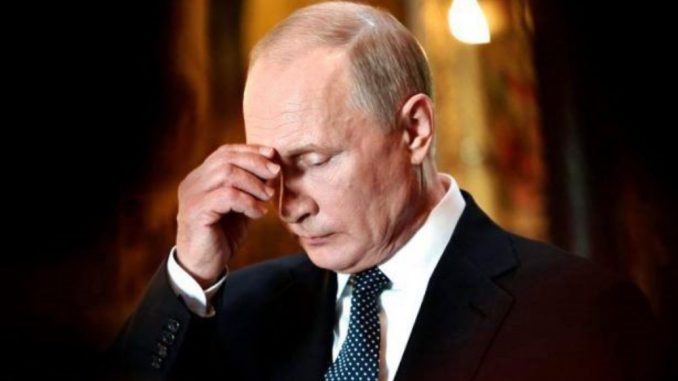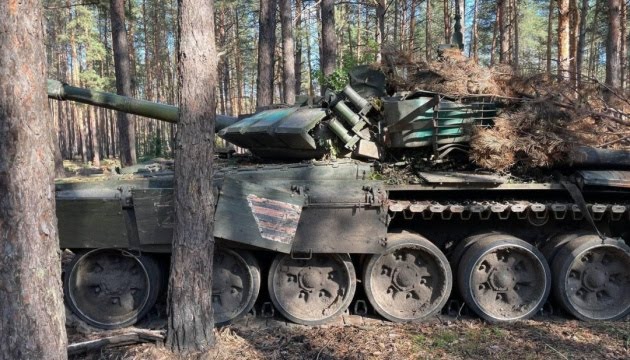
In this article we discuss once again the analysis, characterization and politics of the PTS and its Trotskyist Fraction for the Fourth International against this war, a position that we consider to be mistaken as a whole, as expressed again in a recent article by comrade Claudia Cinatti published in La Izquierda Diario[1].
Pablo Vasco
Let’s start with an elementary methodological question: for every Trotskyist or even Marxist militant, the analysis of any given political situation always has the class struggle as its organizing axis. That is, to break down as best as possible how the relationship of forces between the social classes in conflict is found and what its most likely dynamic is. Leaving this element aside or minimizing it leads to analyzes and characterizations of an economistic or superstructural geopolitical type, but to a greater or lesser extent alienated from the real social structure and therefore mistaken.
It seems to us that the article in question commits this substantive methodological flaw, which strongly invalidates its conclusions. It states, for example: “If every war is waged beyond the strictly military field, in the case of the war in Ukraine the extension of the battlefield is worldwide and encompasses the economy, politics, geopolitics and even the class struggle.” “Even,” as if the class struggle were the least important component in this and any other situation, even if it is a war? The class struggle is well present there and in multiple forms: within Russia and the Ukraine, the prior an invading imperialist and the later an invaded semi-colony, and also within the NATO countries.
But this is not a problem of order of importance in a sentence. Cinatti’s article is titled “The logic of escalation and the multiple fronts of the war in Ukraine.” And indeed, the article analyzes the war from multiple fronts: economic, energy, military, geopolitical… but not from the decisive front: that of the class struggle. In short, the author attributes the Russian military “tactical setbacks” to the fact that “the Ukrainian army, supplied by the United States and NATO, decided to start a counteroffensive” and to the “weapons generously provided by the Pentagon.” It is a unilateral view limited to the military aspect.
Even in a war, the military factor is not the key
If military power were the determining factor for the victory of this or that side, all the results of armed conflicts would be predetermined in advance. With this criterion, given its evident superiority in terms of the most modern and sophisticated weapons, the imperialist United States would be invincible for all eternity. Fortunately for humanity and for the socialist revolution, this has not been, is not and will never be so.
To cite a categorical case of inequality of military force, the victory of Vietnam over the occupation of US imperialism in 1975 has no central military explanation, but rather a political one, of the class struggle: the heroism, high morale and popular support of the communist Vietcong guerrillas versus the low morale of the Yankee troops and the massive anti-war mobilizations within the invading country itself. Closer in time, with its peculiarities, this was also expressed in the harsh US military defeats in Iraq and Afghanistan.
NATO’s provision of weapons to the Ukrainian armed forces is an undeniable fact, given the imperialist interest in strengthening its interference in the entire region. However, that provision is limited. Even Cinatti acknowledges that “Biden has not crossed the ‘red line’ of equipping Ukraine with precision weaponry that can reach Russian territory.” So what is the reason for the advance of the Ukrainian troops and the retreat of the Russian offensive? Among the more than 2,500 words of her long article, the author does not make even the slightest reference to the tenacious resistance of the Ukrainian population against the invasion of their country. Initially, Putin envisioned a blitzkrieg Ukrainian surrender, taking the capital Kyiv and installing a puppet government there. He was unable to. Then he occupied the Russophone areas of the Ukrainian southeast – Donetsk, Lugansk, Kherson and Zaporizhia – and set up the sham plebiscite with a foregone result. This didn’t work out for him either, because he doesn’t have effective troops to consolidate control of the region. Then he stagnated and now he is retreating. So he had to appeal to 300,000 reservists, with the resulting increase in protests in Russia despite harsh repression. In recent days, his missile bombardments of civilian installations in Ukraine express more desperation than offensive solidity and no one can rule out that Putin may turn to using his nuclear arsenal, which would obviously unleash very serious consequences.
In addition to the question of weapons, there is another underlying explanation for the Ukrainian advance: the high morale of its troops and population, who rightly defend their territory, in open contrast to the low morale of the Russian troops and population, who increasingly feel this war for what it really is: completely alien to their interests. The German general and military theoretician Karl von Clausewitz, whom the PTS likes to quote, highlighted the qualitative importance of the components of morale in a war, considering that “they constitute the spirit that permeates the war as a whole and in its first stage establish a close affinity with the will that moves and leads the masses, practically emerging with them, because the will is itself a moral quantity.”[2]
- Proof of low Russian military morale is the abandonment of supplies, including state-of-the-art T-90 tanks, some even with their instruction manuals unopened. According to reports from early October, “Ukraine may have captured 460 Russian main battle tanks, 92 self-propelled howitzers, 448 infantry fighting vehicles, 195 armored personnel carriers and 44 multiple launch rocket systems, although the real number is probably higher.”[ 3] And it is a disbanded retreat, without first destroying or disabling that weaponry, even knowing that it will remain in the hands of the enemy.
- “I refuse to continue my service in the special operation on the territory of Ukraine, due to lack of permission and moral exhaustion,” says the letter from a military section chief to his superiors, found in the city of Izyum after the flight of Russian troops.[4]
- “Recent videos on social media…show shivering Russian recruits lighting camp fires at night in sub-zero temperatures: ‘That’s not going to be a situation where your morale is high in the winter.’ Another video shows reservists from the Omsk region asking when they will be paid; local officials respond that they don’t have the funds…”[5]
- “’I am criticized for driving people into depression with my news…well, the timing is such that there will be no good news in the near future,’ wrote Aleksandr Kots, a pro-Kremlin journalist traveling with the Russian army…’ We don’t have enough people… exhaustion has set in… there are no more forces left to cling to the won territories’.”[6]
Similar symptoms are coming even from the Wagner Group, the Russian mercenary battalion created by millionaire Prigozhin whose members earn between $4,000 and $5,000 a month.[7] In Russia itself, the departure of hundreds of thousands of citizens to other countries to avoid being summoned, and the fact that the Kremlin recruits among imprisoned criminals in exchange for lowering or annulling their sentences, confirm the growing social discontent towards the war.
Logically, the morale of the Ukrainian troops defending their country to free it from the invasion of a foreign imperialist power rises and, on the other hand, the conviction of the Russian forces, sent by Putin to die in a war that is not their own, falls. The PTS article does not make the slightest reference to this basic factor, which is the level of morale and political conviction on the opposing sides. This is the consequence of minimizing the class struggle, in addition to its erroneous characterization regarding the very nature of the war.

What kind of war, what tasks for revolutionaries
“What is the real situation?” the PTS asks in its article. And answers: “Impossible to know for sure.” Then the author limits herself to acknowledging the obvious, “the Ukrainian offensive has changed the dynamic and has accelerated the rhythm of the war,” and only anticipates ambiguities: “a new very fluid political-military situation has opened up, a tense transitional phase…”
Actually, what is new about the war is that one of the open hypotheses is strengthened: the possibility that Ukraine could win and Russia lose. For now, apart from the reluctance towards Russia’s strategy on the part of its partners China and India, only the Chechen dictator Kadyrov and now his Belarusian counterpart Lukashenko promise some military support, while many of the governments of the countries in the region of Russian influence, Armenia, Tajikistan, Kazakhstan, Uzbekistan and Kyrgyzstan, take distance.
Of course, no one has a crystal ball. But one could have much greater “certainty” if at least the opinions of the trade union and political organizations of Ukraine, Russia and the rest of Eastern Europe that are independent of their governments and opponents were taken into account, starting with the Trotskyist organizations. But the PTS and its international Trotskyist Fraction, especially lacking any implantation in the region, do not even bother to consult.
Behind this sufficiency alien to any revolutionary method is its erroneous characterization of the war, which according to the article “has increasingly taken on a character of a ‘proxy war’ of the United States and NATO against Russia through the Ukrainian side.” Proxy war means a war on behalf of or on the land of others. That is to say, the PTS is almost on the verge of defining it as a war between imperialisms, which is a blunder, in fact beneficial to Putin.
Nothing further from reality. As we have maintained from the ISL, this war combines two conflicts: the inter-imperialist confrontation between Russia and NATO-United States to gain influence and the just war of national liberation or self-defense of the invaded Ukraine against the invading Russia. Of course, the necessary internationalist solidarity with the Ukrainian resistance in no way implies political support for the Zelensky capitalist government. On the contrary: it is necessary to denounce that they take advantage of the war situation to attack the rights of the working class and favor the capitalists.
As our comrade Sergio García points out in another article of debate with the PTS: “In wars there is no space to make propaganda outside of the real military struggle, nor for supposed neutralities or defeatism within the invaded country, which only leads to favoring the invading power. Nor can a revolutionary party be built within Ukraine without being an active part of the workers’ and people’s resistance so that it can triumph over its oppressors in Putin’s Russia. Only a distante, western leftist eye can fail to see that this perspective is essential for developing revolutionary politics throughout Eastern Europe. And those who do not position themselves in this way cannot advance in building revolutionary organizations throughout this immense region. Fortunately, the ISL, with these politics, in a difficult situation, continues to organize workers and youth, advancing with our Ukrainian and Belarusian sections and with comrades in Russia who today are being persecuted by the regime.”[8]
[1] https://www.laizquierdadiario.com/La-logica-de-la-escalada-y-los-multiples-frentes-de-la-guerra-en-Ucrania
[2] Clausewitz, Carl Von; On War (Sobre la guerra); Princeton University Press. Princeton, New Jersey. 1984. Book three On Strategy in General (Sobre la estrategia en general), Chapter one.
[3] https://www.larazon.es/internacional/20221006/qw7yksfsrfgr3oq3poppkjby4a.html
[4] https://www.tf1info.fr/international/guerre-ukraine-russie-contre-offensive-ukrainienne-des-lettres-de-soldats-russes-confirment-l-epuisement-moral-des-troupes-2232514.html
[5] https://www.economist.com/briefing/2022/10/06/ukraines-military-success-is-reshaping-russia-as-well-as-the-war
[6] https://www.theguardian.com/world/2022/oct/05/attempts-to-play-down-retreats-ukraine-russia-war-kremlin-military-failure
[7] https://cnnespanol.cnn.com/2022/10/07/moral-desploma-wagner-ejercito-privado-putin-guerra-rusia-ucrania-trax/
8 https://lis-isl.org/2022/09/30/cambios-en-la-guerra-de-ucrania-motivos-consecuencias-y-debates/








